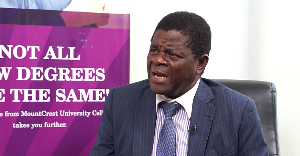President Nana Addo Dankwa Akufo-Addo is said to appoint a new substantive Special Prosecutor (SP) in the coming days to replace Martin ABK Amidu who resigned as the first Special Prosecutor.
A report by Asaase radio, sighted by GhanaWeb indicated that the appointment of the new SP is in line with the Office of the Special Prosecutor Act, 2017 (Act 959) which compels the President Akufo-Addo to within six months of the position being vacant, appoint a Special Prosecutor.
Martin Amidu on November 16, 2020, resigned from office over what he described as “executive interference” in his work as Special Prosecutor. A charge that was vehemently denied by the presidency.
He was criticized by some civil society actors for the reason he gave for resigning.
The CSOs maintained that the law offered him enough protection to stay in office and perform his duties without interference and that there was no clear evidence of any executive interference that should have triggered his resignation.
Akufo-Addo in accepting Amidu’s resignation directed that all that he required to facilitate his smooth transition from the Office of Special Prosecutor be afforded him.
Jane Cynthia Naa Koshie Lamptey, the Deputy Special Prosecutor, following Martin Amidu’s resignation was asked to act as the SP in accordance with section 17 (3) of Act 959.
The said provision states, “the Deputy Special Prosecutor shall act in the absence of the Special Prosecutor or in the event of a vacancy in the position of the Special Prosecutor”.
She has held the fort for over five months.
“Whilst happy to play the acting role, the experienced prosecutor has made it clear that she will not be interested in a permanent elevation,” the report read.
The OSP Mandate
Act 959, which establishes the Office of the Special Prosecutor, spells out three main objectives of the Office, namely: (i) investigate and prosecute alleged corruption or suspected corruption and corruption-related offences, (ii) recover the proceeds of corruption and corruption-related offences, and (iii) take steps to prevent corruption.
Functions of the OSP
The functions entrusted to the Office are: (a) the investigation and prosecution of cases of alleged or suspected corruption and corruption-related offences under the Public Procurement Act, 2003 (Act 663); (b) investigation and prosecution of cases of alleged corruption and corruption-related offences under the Criminal Offences Act, 1960 (Act 29) involving public officers, politically exposed persons and persons in the private sector involved in the commission of the offence;
Other functions
(c) investigation and prosecution of cases of alleged or suspected corruption and corruption-related offences involving public officers, politically exposed persons and persons in the private sector involved in the commission of the offence under any other relevant law; (d) recover and manage the proceeds of corruption;
(e) disseminate information gathered in the course of investigation to competent authorities and other persons the Office considers appropriate in connection with the offences specified in paragraphs (a) and (b);
The Office of Special Prosecutor is to further: (f) co-operate and coordinate with competent authorities and other relevant local and international agencies in furtherance of the Act; and (g) receive and investigate complaints from a person on a matter that involves or may involve corruption and corruption-related offences.
General News of Monday, 26 April 2021
Source: www.ghanaweb.com



















